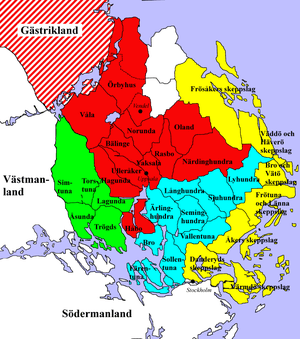Roden, Sweden
Roden (roðer, "rowing") is the old designation of the coastal areas of Svealand (the yellow areas in the map), that in wartime would man and equip the ships that sailed out in ledung. [1]

red = Tiunda
cyan = Attunda
yellow = Roden
green = Fjärdhundra
The coast line has changed considerably in the last millennium due to Post-glacial rebound. Originally there was a sea bay coming in from the north all the way into Uppsala
It was not only the eastern part of the province of Uppland that was called "Roden" (called Sæland by Snorri Sturluson) but also other provinces by the Swedish "East sea" (Baltic Sea), like the coastal areas of the province Östergötland.
The scholarly consensus [2] is that the Rus' people originated in what is currently coastal eastern Sweden around the eighth century and that their name has the same origin as Roslagen in Sweden (with the older name being Roden). [3] [4] [5] According to the prevalent theory, the name Rus', like the Proto-Finnic name for Sweden (*Ruotsi), is derived from an Old Norse term for "the men who row" (rods-) as rowing was the main method of navigating the rivers of Eastern Europe, and that it could be linked to the Swedish coastal area of Roslagen (Rus-law) or Roden, as it was known in earlier times.[6][7] The name Rus' would then have the same origin as the Finnish and Estonian names for Sweden: Ruotsi and Rootsi.[7][8]
References
- https://www.swedishfreak.com/culture/swedish-history/the-viking-age/
- https://www.historyextra.com/period/viking/the-vikings-at-home/
- https://www.ancient.eu/Kievan_Rus/
- https://www.metmuseum.org/toah/hd/vikg/hd_vikg.htm
- https://www.timetraveltours.se/blog/swedish-vikings-and-the-eastern-world/
- Blöndal, Sigfús (1978). The Varangians of Byzantium. Cambridge University Press. p. 1. ISBN 9780521035521. Retrieved 2 February 2014.
- Stefan Brink, 'Who were the Vikings?', in The Viking World, ed. by Stefan Brink and Neil Price (Abingdon: Routledge, 2008), pp. 4-10 (pp. 6-7).
- "Russ, adj. and n." OED Online, Oxford University Press, June 2018, www.oed.com/view/Entry/169069. Accessed 25 July 2018.